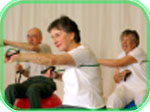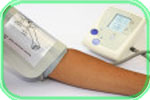
Benefits
Of Exercise
Longevity
and Aging:
 Exercise,
even after age 50, can add healthy and active years to one's
life. Studies continue to show that it is never too late
to start exercising and that even small improvements in
physical fitness can significantly lower the risk of death.
Simply walking regularly can prolong life in the elderly.
Moderately fit people, even if they smoke or have high blood
pressure, have a lower mortality rate than the least fit.
Exercise,
even after age 50, can add healthy and active years to one's
life. Studies continue to show that it is never too late
to start exercising and that even small improvements in
physical fitness can significantly lower the risk of death.
Simply walking regularly can prolong life in the elderly.
Moderately fit people, even if they smoke or have high blood
pressure, have a lower mortality rate than the least fit.
Resistance
training is important for the elderly, because it is the
only form of exercise that can slow and even reverse the
decline in muscle mass, bone density, and strength. Adding
workouts that focus on speed and agility may be even more
protective for older people. Flexibility exercises help
reduce the stiffness and loss of balance that accompanies
aging.
Cardiovascular
Health (Heart Disease and Stroke):
 General
Guidelines. Inactivity is one of the four major risk
factors for heart disease, on par with smoking, unhealthy
cholesterol, and even high blood pressure. Like all muscles,
the heart becomes stronger and larger as a result of exercise
so it can pump more blood through the body with every beat.
Exercise does not increase the maximum heart rate, but a
fit heart can pump more blood at this maximum level and
can sustain it longer with less strain.
General
Guidelines. Inactivity is one of the four major risk
factors for heart disease, on par with smoking, unhealthy
cholesterol, and even high blood pressure. Like all muscles,
the heart becomes stronger and larger as a result of exercise
so it can pump more blood through the body with every beat.
Exercise does not increase the maximum heart rate, but a
fit heart can pump more blood at this maximum level and
can sustain it longer with less strain.
The resting heart rate of those who exercise is also slower,
because less effort is needed to pump blood. For preventing
heart disease frequency of exercises may be more important
than duration. Exercise even helps reverse some of the effects
of smoking. Children should be especially encouraged to
exercise every day to prevent heart disease later in life.
High
Blood Pressure:
 Studies
indicate that regular exercise helps keep arteries elastic,
even in older people, which in turn keeps blood flowing
and blood pressure low. Sedentary people have a 35% greater
risk of developing hypertension than athletes do. No person
with high blood pressure should start an exercise program
without consulting a physician. Studies have shown that
high-intensity exercise may not lower blood pressure as
effectively as moderate intensity exercise.
Studies
indicate that regular exercise helps keep arteries elastic,
even in older people, which in turn keeps blood flowing
and blood pressure low. Sedentary people have a 35% greater
risk of developing hypertension than athletes do. No person
with high blood pressure should start an exercise program
without consulting a physician. Studies have shown that
high-intensity exercise may not lower blood pressure as
effectively as moderate intensity exercise.
In
one study, for example, moderate exercise (jogging two miles
a day) controlled hypertension so well that more than half
the patients who had been taking drugs for high blood pressure
were able to discontinue their medication. Studies have
indicated that T'ai Chi, an ancient Chinese exercise involving
slow, relaxing movements may lower blood pressure almost
as well as moderate-intensity aerobic exercises. Before
exercising, people with hypertension should avoid caffeinated
beverages, which increase heart rate, the workload of the
heart, and blood pressure during physical activity.
Stroke:
 The
benefits of exercise on stroke are uncertain. According
to one analysis, a group of 11,000 men, men who burned between
2,000 and 3,000 calories a week (about an hour of brisk
walking five days a week) cut their risk of stroke in half.
Groups who burned between 1,000 and 2,000 calories or more
than 3,000 calories per week also gained some protection
against stroke but to a lesser degree. In the same study,
exercise that involved recreation was more protective than
exercise routines consisting simply of walking or climbing.
The
benefits of exercise on stroke are uncertain. According
to one analysis, a group of 11,000 men, men who burned between
2,000 and 3,000 calories a week (about an hour of brisk
walking five days a week) cut their risk of stroke in half.
Groups who burned between 1,000 and 2,000 calories or more
than 3,000 calories per week also gained some protection
against stroke but to a lesser degree. In the same study,
exercise that involved recreation was more protective than
exercise routines consisting simply of walking or climbing.




 Exercise,
even after age 50, can add healthy and active years to one's
life. Studies continue to show that it is never too late
to start exercising and that even small improvements in
physical fitness can significantly lower the risk of death.
Simply walking regularly can prolong life in the elderly.
Moderately fit people, even if they smoke or have high blood
pressure, have a lower mortality rate than the least fit.
Exercise,
even after age 50, can add healthy and active years to one's
life. Studies continue to show that it is never too late
to start exercising and that even small improvements in
physical fitness can significantly lower the risk of death.
Simply walking regularly can prolong life in the elderly.
Moderately fit people, even if they smoke or have high blood
pressure, have a lower mortality rate than the least fit.
 General
Guidelines. Inactivity is one of the four major risk
factors for heart disease, on par with smoking, unhealthy
cholesterol, and even high blood pressure. Like all muscles,
the heart becomes stronger and larger as a result of exercise
so it can pump more blood through the body with every beat.
Exercise does not increase the maximum heart rate, but a
fit heart can pump more blood at this maximum level and
can sustain it longer with less strain.
General
Guidelines. Inactivity is one of the four major risk
factors for heart disease, on par with smoking, unhealthy
cholesterol, and even high blood pressure. Like all muscles,
the heart becomes stronger and larger as a result of exercise
so it can pump more blood through the body with every beat.
Exercise does not increase the maximum heart rate, but a
fit heart can pump more blood at this maximum level and
can sustain it longer with less strain. Studies
indicate that regular exercise helps keep arteries elastic,
even in older people, which in turn keeps blood flowing
and blood pressure low. Sedentary people have a 35% greater
risk of developing hypertension than athletes do. No person
with high blood pressure should start an exercise program
without consulting a physician. Studies have shown that
high-intensity exercise may not lower blood pressure as
effectively as moderate intensity exercise.
Studies
indicate that regular exercise helps keep arteries elastic,
even in older people, which in turn keeps blood flowing
and blood pressure low. Sedentary people have a 35% greater
risk of developing hypertension than athletes do. No person
with high blood pressure should start an exercise program
without consulting a physician. Studies have shown that
high-intensity exercise may not lower blood pressure as
effectively as moderate intensity exercise.  The
benefits of exercise on stroke are uncertain. According
to one analysis, a group of 11,000 men, men who burned between
2,000 and 3,000 calories a week (about an hour of brisk
walking five days a week) cut their risk of stroke in half.
Groups who burned between 1,000 and 2,000 calories or more
than 3,000 calories per week also gained some protection
against stroke but to a lesser degree. In the same study,
exercise that involved recreation was more protective than
exercise routines consisting simply of walking or climbing.
The
benefits of exercise on stroke are uncertain. According
to one analysis, a group of 11,000 men, men who burned between
2,000 and 3,000 calories a week (about an hour of brisk
walking five days a week) cut their risk of stroke in half.
Groups who burned between 1,000 and 2,000 calories or more
than 3,000 calories per week also gained some protection
against stroke but to a lesser degree. In the same study,
exercise that involved recreation was more protective than
exercise routines consisting simply of walking or climbing.